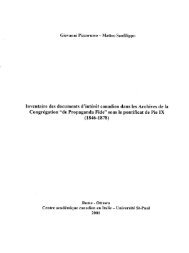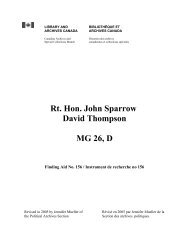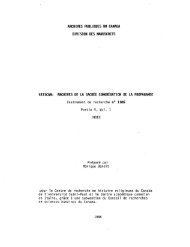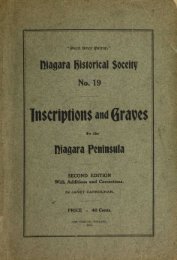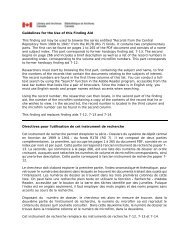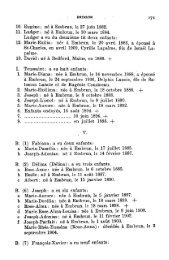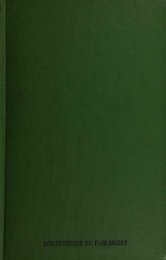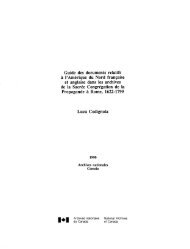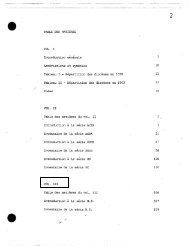Guide to Documents Relating to French and British North America in ...
Guide to Documents Relating to French and British North America in ...
Guide to Documents Relating to French and British North America in ...
You also want an ePaper? Increase the reach of your titles
YUMPU automatically turns print PDFs into web optimized ePapers that Google loves.
<strong>in</strong>discrim<strong>in</strong>ate growth, s<strong>in</strong>ce the thirteen cont<strong>in</strong>ental colonies had almost 1.2 million <strong>in</strong>habitants by the<br />
1750s, <strong>and</strong> only the common fear of their Canadian neighbours had enabled Engl<strong>and</strong> <strong>to</strong> keep a firm<br />
grip over its overseas terri<strong>to</strong>ries. lS<br />
S<strong>in</strong>ce the Holy See generally lacked <strong>in</strong>terest <strong>in</strong> <strong>North</strong> <strong>America</strong>, Propag<strong>and</strong>a planned <strong>and</strong><br />
implemented the gamut of <strong>North</strong> <strong>America</strong>n policies. Everyone <strong>in</strong> Rome seemed <strong>to</strong> be aware that <strong>North</strong><br />
<strong>America</strong> was Propag<strong>and</strong>a's responsibility, <strong>and</strong> duly forwarded every matter perta<strong>in</strong><strong>in</strong>g <strong>to</strong> the New World<br />
<strong>to</strong> its officials. Most of Propag<strong>and</strong>a's decisions did not require anyone's approval. Indeed, a number<br />
were made <strong>in</strong> the presence of the Pope ("coram Sanctissimo") or submitted <strong>to</strong> the Pope by the<br />
Congregation's secretary at regular meet<strong>in</strong>gs called "Udienze." But the Pope always sanctioned these<br />
decisions <strong>and</strong> never tried <strong>to</strong> <strong>in</strong>fluence them. On certa<strong>in</strong> matters, Propag<strong>and</strong>a could not decide alone <strong>and</strong><br />
turned <strong>to</strong> other congregations, usually the Sacred Congregation of the Rites or the Holy Office. Here<br />
aga<strong>in</strong>, Propag<strong>and</strong>a's decisions were never reversed. Conversely, Propag<strong>and</strong>a received a number of<br />
letters, petitions <strong>and</strong> requests whose writers had wrongly addressed the Pope. The latter merely<br />
forwarded them via the secretary of state <strong>to</strong> Propag<strong>and</strong>a, which managed <strong>to</strong> avoid jealous rivalries by<br />
tak<strong>in</strong>g over these matters. The Congregation <strong>in</strong>telVened so well that dur<strong>in</strong>g the seventeenth <strong>and</strong><br />
eighteenth centuries there is only one example of a dispute between it <strong>and</strong> another Roman department<br />
with regard <strong>to</strong> <strong>North</strong> <strong>America</strong>. It <strong>to</strong>ok place <strong>in</strong> 1661, when the vicar apos<strong>to</strong>lic of Canada, Fran90is de<br />
Laval, bishop of Petraea, <strong>and</strong> the archbishop of Rouen, Fran90is de Harlay de Champvallon, were<br />
fight<strong>in</strong>g over the creation of a full bishopric <strong>in</strong> Quebec. Champvallon ma<strong>in</strong>ta<strong>in</strong>ed that Canada was <strong>and</strong><br />
had always been under his jurisdiction, <strong>and</strong> tried <strong>to</strong> establish his own hierarchy <strong>in</strong> Canada through the<br />
Sulpicians of Montreal. One of these, Gabriel Thubieres de Levy de Queylus, had personally gone <strong>to</strong><br />
Rome <strong>and</strong>, bypass<strong>in</strong>g Propag<strong>and</strong>a, had requested the creation of a parish <strong>in</strong> Montreal, claim<strong>in</strong>g that it<br />
was under the jurisdiction of Rouen. S<strong>in</strong>ce the Dataria Apos<strong>to</strong>lica had taken for granted Montreal's<br />
location <strong>in</strong> France, Queylus hav<strong>in</strong>g carefully avoided mention<strong>in</strong>g the truth, it complied with Queylus's<br />
request. When Mario Alberizzi, secretary of Propag<strong>and</strong>a, realized what had happened, he became furious<br />
<strong>and</strong> put pressure on his puzzled colleagues at the Dataria, thus caus<strong>in</strong>g the concession <strong>to</strong> be revoked. l6<br />
It may well be said, then, that as far as <strong>North</strong> <strong>America</strong> was concerned, Propag<strong>and</strong>a alone spoke for<br />
the Holy See, whereas other Roman agencies <strong>and</strong> even the Pope himself had only occasional<br />
communications with the New World. (The relationship between Propag<strong>and</strong>a <strong>and</strong> the regular orders was,<br />
however, far more complex, as we shall see later.)<br />
Thus the Holy See's policy <strong>to</strong>ward <strong>North</strong> <strong>America</strong> was Propag<strong>and</strong>a's policy, which <strong>in</strong> tum was<br />
shaped over the years by a h<strong>and</strong>ful of Roman officials who dealt with <strong>North</strong> <strong>America</strong> as part of their<br />
duties cover<strong>in</strong>g the entire world. Their own knowledge of <strong>America</strong>n matters was fundamental <strong>to</strong> every<br />
decision Propag<strong>and</strong>a officials <strong>to</strong>ok with regard <strong>to</strong> the New World. Yet none of them had ever been <strong>to</strong><br />
<strong>North</strong> <strong>America</strong>, none spoke English <strong>and</strong> very few spoke <strong>French</strong>: Italian <strong>and</strong> Lat<strong>in</strong> were often the only<br />
languages they could underst<strong>and</strong>. Under Benedict XIV (1740-1758), for example, only one person <strong>in</strong><br />
the Vatican unders<strong>to</strong>od German. (Most <strong>in</strong>com<strong>in</strong>g letters written <strong>in</strong> a language other than Italian or Lat<strong>in</strong><br />
were read <strong>in</strong>.translation -- usually prepared by the foreign clergy's special agents who resided <strong>in</strong> Rome<br />
-- <strong>and</strong> on at least one occasion diplomatic difficulties were caused by a bad translation).17Besides,<br />
<strong>North</strong> <strong>America</strong> was not the object of gossip or public writ<strong>in</strong>g, nor could Propag<strong>and</strong>a officials hope <strong>to</strong><br />
ga<strong>in</strong> additional <strong>in</strong>formation through social occasions or similar gather<strong>in</strong>gs. Unlike bureaucrats <strong>in</strong> France<br />
<strong>and</strong> Engl<strong>and</strong>, they seem not <strong>to</strong> have been aware of the copious literature relat<strong>in</strong>g <strong>to</strong> the New World<br />
that was published <strong>in</strong> Italy alone, not <strong>to</strong> mention the rest of Europe. ls The only explicit reference <strong>to</strong><br />
published sources that is <strong>to</strong> be found <strong>in</strong> the documents preselVed <strong>in</strong> the archives of Propag<strong>and</strong>a is <strong>to</strong><br />
Lo~is Moreri's Gr<strong>and</strong> dictionnaire his<strong>to</strong>rique <strong>and</strong> <strong>to</strong> the Jesuit Lettres edifiantes et curieuses, both used<br />
<strong>to</strong> describe the geography of Canada. The reference, however, is <strong>in</strong> a report written by Pierre-Herman<br />
Dosquet, bishop of Samos <strong>and</strong> coadju<strong>to</strong>r of the bishop of Quebec, not by an official of the<br />
Congregation. l9<br />
4




